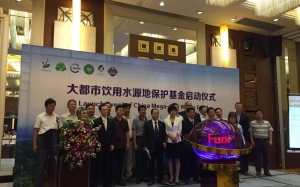Chinese Citizens Take Charge of their Water
- 2015-08-28 15:30:00
- admin Original
- 2916
Launch of the China Mega-City Water Fund
On Friday, August 28th, BFS celebrated the official launch of the China Mega-City Water Fund (CMWF), which is initiated by PMWP (Partnership for Mega-City Water Protection), the China Biodiversity Conservation and Green Development Foundation (CBCGDF), IUCN, Forest Trends, the Chinese Society of Soil and Water Conservation and of course BFS.
“This will enable citizens and companies all over Beijing to contribute to the sustainable development of Beijing’s possibly most valuable resource: water”, remarks Li Hao, Project Director at BFS.
Indeed it seems that the fiercest threat to the city is not a dust storm or the question of energy supply – it is providing enough fresh and clean water with affordable pricing to 20 million citizens. The Chinese government has tried to move heaven and earth, not only through afforestation projects in the 70s and 80s in the Miyun watershed to reduce sediment flow and improve water quality, but also quite literally with the South-to-North Water Diversion Project which will channel additional water from the Yangtze River to quench the Beijing’s thirst. Nevertheless the importance of the Miyun watershed is rising and as it provides 70-80% of the surface drinking water in Beijing, keeping its water clean is crucial.
With all of China focusing more and more on sustainability, it’s not only the government acting on these issues anymore, in fact more and more companies and individuals feel the need to make their own contributions to solving this problem. The CMWF will give them the opportunity to do so.
The CMWF – all for one and one for all
What makes the new water fund different is not only the idea that private entities can contribute to sustainable development but also the degree of localization and cost effectiveness. One of the major obstacles in the past has been the sheer scale of the state programs targeting sustainability issues. While they indeed covered wide areas, there ultimate effectiveness was at times compromised – failing to pay farmers for planting activities or setting unsustainable incentives, so that the programs achievements were reverted after the program and therefore its subsidies ended. The China Mega-City Water Fund will work on a project-by-project basis to ensure that future projects are self-perpetuating while also choosing only the most cost-effective projects proposed.
As this is, so to say, a water fund by the people for the people, an equal representation of all involved parties – government, universities, NGOs, companies and other fund contributors – will be ensured by having them on the management board and/or the technical advisory board. These boards will decide which projects to pursue. The activities will fall in one of 3 categories: upstream activities, downstream activities or fundamental operations. The upstream activities will in the beginning be the main focus as most of the water improvement opportunities are there. But educating the consumers downstream in Beijing is important to raise awareness about watershed protection and e.g. creating a watershed database that keeps track of all projects as part of the fundamental operations will contribute to an overall more efficient and credible water fund.
Upstream Activities
The water fund will not just support any kind of project to improve water conditions but will largely work with forms of incentive payments. This can span from the classical method of reimbursing people with their opportunity cost to change a certain practice (e.g. use less pesticides) to so-called „Alternative Intervention Schemes“. As mentioned in the beginning, while initial incentive payments are often crucial to catalyze change, the sustainability of these changes after payment ceases is often not guaranteed. Therefore the CMWF will combine these traditional incentive payments with activities that help transition the new behavior from an opportunity cost into a cost-effective measure. To take the example from earlier, while a reduction in pesticides might initially harm harvest, ultimately with training sessions on improving farming techniques the yield should return to the same level or even get higher, so that a cessation of incentive payments poses no threat to the continuation of the new behavior.
Of course, the other big part of such “Alternative Intervation Schemes” are the one-time improvements that contribute long- term to the improvement of water quality: eco-toilets, riparian buffer restorations, the initial transition from mono-cultures to species-rich forests.
The Future of CMWF
The China Mega-City Water Fund is obviously not named like this to stay restricted to Beijing – this fund, should it prove to be successful, will be establish in Mega-Cities all over China, especially the ones already participating in the PMWP scheme. Therefore this launch only marks the beginning of a remarkable journey to enable Chinese citizens all over the country to take the fate of their water resources in their own hands.

